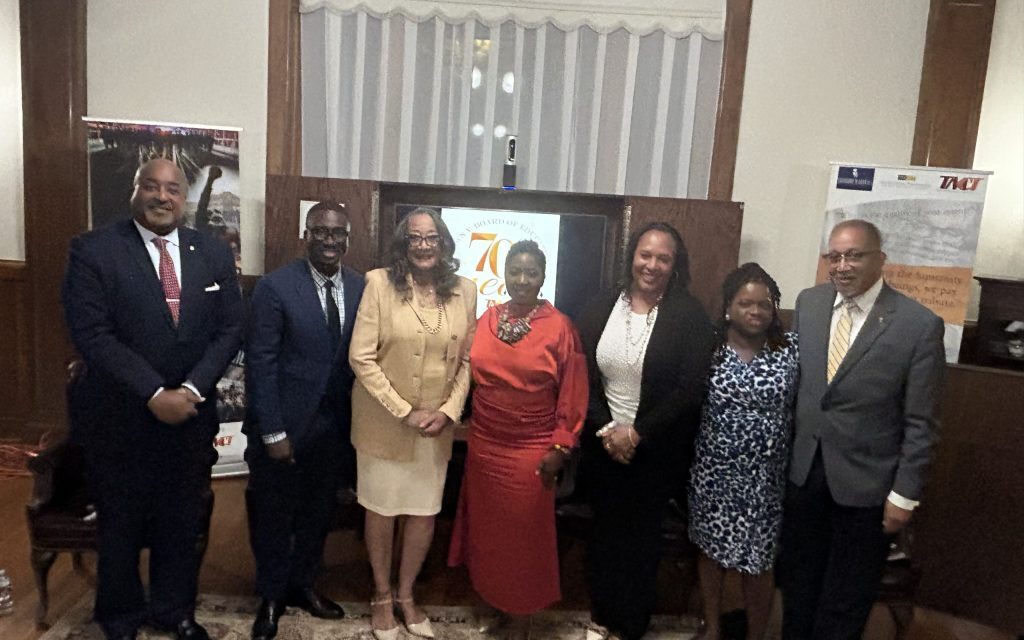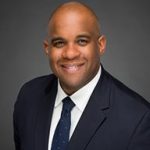By D. Kevin McNeir
Special to the AFRO
Despite the inclement weather, an enthusiastic group numbering several dozen gathered in Northwest Washington, D.C. on May 9, for two purposes: to commemorate the 70th anniversary of the landmark U.S. Supreme Court case, Brown v. Board of Education and to celebrate the life and legacy of the social justice icon, the Honorable Thurgood Marshall.

The event, sponsored by the Thurgood Marshall Center Trust (TMCT), featured a panel discussion that included some of the greatest minds in the Greater Washington Area. The gathering took place at the Thurgood Marshall Center for Service and Heritage – now an historic landmark and the first YMCA in the country designated for African Americans.
White House Correspondent for the American Urban Radio Network, Ebony McMorris, moderated a panel discussion that challenged the audience, while also forcing them to consider the possibility that our nation’s highest court might one day–as it has recently done with other highly controversial cases like Roe v. Wade– decide that Brown v. Board has run its course and should be overruled.
Panelists included a TMCT board member Rawle Andrews Jr., Esq. , who currently serves the American Psychiatric Association Foundation as executive director and The Bar Association of D.C. as the 135th president; Kim Keenan, Esq., former NAACP general counsel and past president of the National Bar Association; and Dr. Jean Accius, president and CEO of Creating Healthier Communities. Also joining the panel was Barbara Arnwine, Esq., president and founder, Transformative Justice Coalition and co-host for the informative weekly Radio One talk show, “Igniting Change.”
Keeping the legacy of Thurgood Marshall alive
During opening remarks, Dr. Benjamin F. Chavis, TMCT board chair and National Newspaper Publishers Association president, shared his thoughts about his formative years of public education, particularly after the Supreme Court ruled in favor of Brown v. Board on May 17, 1954.
“Seventy years ago, I was a student in the North Carolina Colored School System and despite Brown v. Board, I went through school in a system that remained segregated because the cities and counties in North Carolina fought against the court’s ruling. Malcolm X had it right when he said, ‘As long as you are South of the Canadian border, you are South.’
“If we want to keep Thurgood Marshall’s legacy alive, we must get the vote out because the powers that be want to not only turn back the clock but also deny us our rights,” said Chavis. “Banning books has served as the latest example but religion is also being used today as well. As for Donald Trump, he serves as an existential threat to Thurgood Marshall.”
Arnwine, whose office is located in the center, noted that the man for whom the building is now named both “changed the world and set things in motion.”

“Brown v. Board was one of the few cases in which the court talked about [the impact of] White supremacy. I have no doubt that given the way the case has been inaccurately portrayed, today’s court would not have come up with the same decision,” said Arnwine. “For more than a century, the court has been dominated by conservative rule. However, if America wants to continue to claim to be the home of a just and inclusive, multi-racial society, then we [and the court] must be ready to open, not close avenues to opportunity for all its citizens.”
Andrews delivered a primer about the five cases that were involved in the Brown v. Board of Education Supreme Court case, emphasizing that for those living in the District, Bolling v. Sharpe– not Brown v. Board– had the greatest impact on African Americans.
“You’re now sitting in the building that was once the 12th Street YMCA – it was for Blacks and it has been here since 1854,” Andrews said. “One hundred years later, in 1953, if you were living in America and you were Black, then you were living under the American apartheid system. People would like to call it something else – perhaps in efforts to sugarcoat things – but that’s what it was.”
“What I continue to grapple with as a D.C. lawyer– one who has lived here for 30 years– is the fact that of the five cases, only Bolling v. Sharpe had an impact on opportunities for African Americans,” he said, adding that Board of Education was a group of five legal appeals that challenged the ‘separate but equal’ basis for racial segregation in public schools in Kansas, Virginia, Delaware, South Carolina and the District of Columbia.
“Because D.C. is not a state, the 14th Amendment doesn’t apply,” explained Andrews. “So, in reality, the court could have ruled against the case and simply said let Congress figure it out. We know how that always ends for those living in the District, especially today when we have little less than a do-nothing Congress on the Hill.”
Yes, race still matters in America
Keenan, agreeing with Chavis, said “unlike Whites, Blacks don’t have the luxury as voters to say, ‘I don’t like any of the candidates’ or ‘I’m just going to stay home and not vote this time.’”
“We cannot forget the fact that everything Blacks have gotten in America in our struggle for equal rights, has been achieved because of the vote,” she said. “The Supreme Court may have a majority now that’s clearly stuck in the past but look – if we go back far enough, and roll the clock back in turn, Thurgood Marshall would not have been allowed to marry his wife (Cecilia Suyat Marshall).”
“One thing I learned during my years with the NAACP is there are no permanent enemies or permanent friends – just permanent issues,” Keenan added.
Accius changed the tenor of the discussion when he inserted his thoughts about how American policies represent values.
“Policy is so systematically embedded in the American psyche that it tells us who is deserving and who is not,” he said. “The most precious thing we have next to education is health because health–good health– gives us more time, and time is something that cannot be replicated. Time is also expensive.”
“Consider, why is it possible that Blacks living less than five miles away from a community of Whites can have a life expectancy that is 15 years less than that of their White counterparts? Accius asked.
For illustrative purposes, he compared the 93-year life expectancy for White men living in the Georgetown area of the nation’s capital, compared to the life expectancy of Black men living in Anacostia, at just 64 years. Accius further described the indicators that target Black communities and lead to the differing rates as “insidious, but intentional.”
Anacostia parents were the impetus for Bolling v. Sharpe
The roots of the Bolling v. Sharpe case can be traced to D.C.’s Anacostia community. After the D.C. Board of Education denied a petition by a group of parents to racially integrate John Phillip Sousa Junior High School, the following year, in 1950, the parents sought admission to the all-White school for 11 African American children.
In Bolling v. Sharpe, the Court, mirroring Brown v. Board of Education, ruled unanimously that school segregation by race in the District was as unconstitutional as school segregation in the states. However, the Court rendered a separate opinion on Bolling v. Sharpe, based on the Fifth Amendment because the 14th Amendment was not applicable to the District of Columbia, as it was not a state.
Chief Justice Earl Warren, who authored the decision, said the Court found that racial discrimination in D.C.’s public schools denied Blacks due process of law as protected by the Fifth Amendment.
Today, “Anacostia looks a lot different now than it did in the 1950s,” Andrews said. “It was mostly White back then and most of the schools were severely overcrowded. Black parents weren’t asking for public schools to end the policy of segregation. All those few Black parents living in Anacostia wanted was the opportunity for their children to be able to attend a good school.”
The post Scholars, education leaders discuss 70th anniversary of Brown v. Board of Education appeared first on AFRO American Newspapers.










